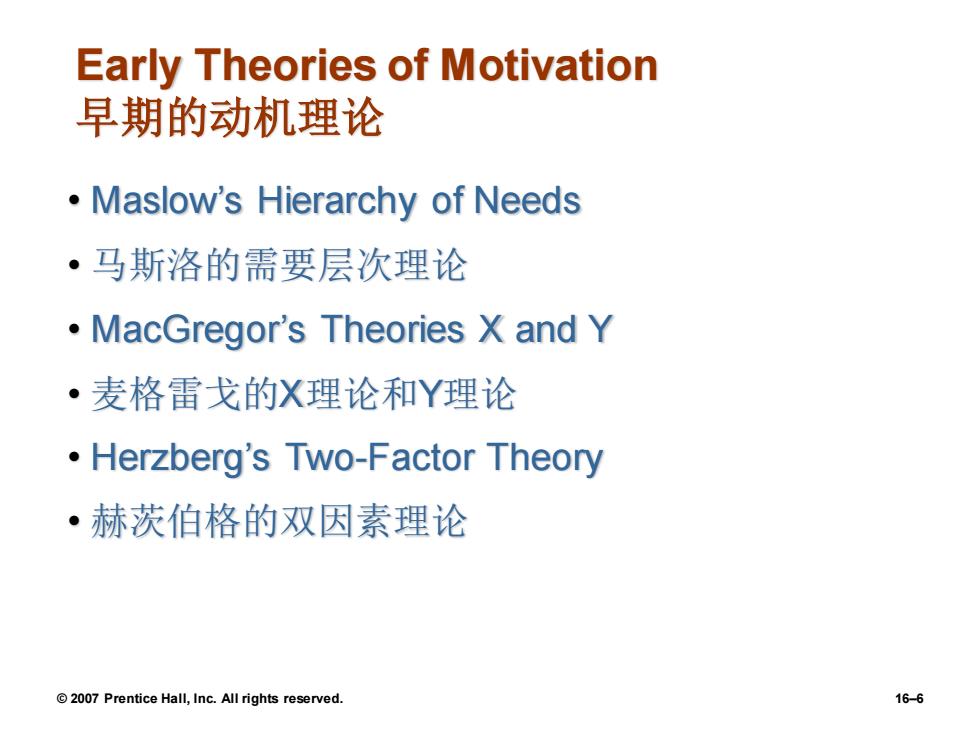
Early Theories of Motivation 早期的动机理论 Maslow's Hierarchy of Needs ·马斯洛的需要层次理论 MacGregor's Theories X and Y ·麦格雷戈的X理论和Y理论 Herzberg's Two-Factor Theory ·赫茨伯格的双因素理论 2007 Prentice Hall,Inc.All rights reserved. 16-6
© 2007 Prentice Hall, Inc. All rights reserved. 16–6 Early Theories of Motivation 早期的动机理论 • Maslow’s Hierarchy of Needs • 马斯洛的需要层次理论 • MacGregor’s Theories X and Y • 麦格雷戈的X理论和Y理论 • Herzberg’s Two-Factor Theory • 赫茨伯格的双因素理论
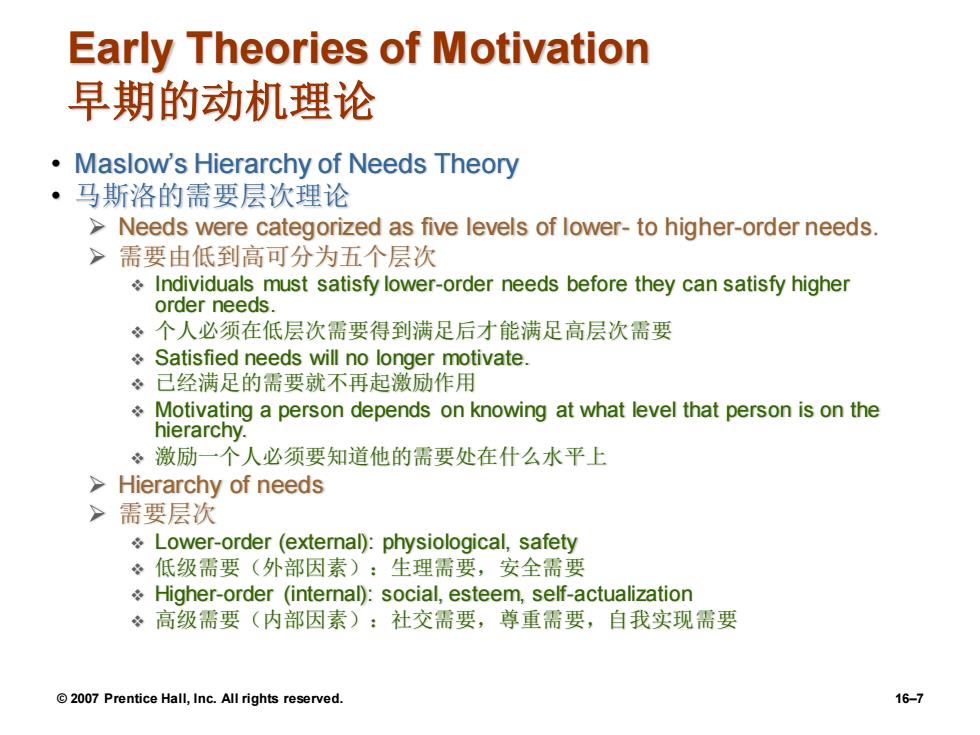
Early Theories of Motivation 早期的动机理论 Maslow's Hierarchy of Needs Theory ·马斯洛的需要层次理论 Needs were categorized as five levels of lower-to higher-order needs. >需要由低到高可分为五个层次 Individuals must satisfy lower-order needs before they can satisfy higher order needs. ·个人必须在低层次需要得到满足后才能满足高层次需要 Satisfied needs will no longer motivate. ÷已经满足的需要就不再起激励作用 Motivating a person depends on knowing at what level that person is on the hierarchy. 。激励一个人必须要知道他的需要处在什么水平上 >Hierarchy of needs >需要层次 Lower-order (external):physiological,safety 。低级需要(外部因素):生理需要,安全需要 Higher-order (internal):social,esteem,self-actualization 。高级需要(内部因素):社交需要,尊重需要,自我实现需要 2007 Prentice Hall,Inc.All rights reserved. 16-7
© 2007 Prentice Hall, Inc. All rights reserved. 16–7 Early Theories of Motivation 早期的动机理论 • Maslow’s Hierarchy of Needs Theory • 马斯洛的需要层次理论 ➢ Needs were categorized as five levels of lower- to higher-order needs. ➢ 需要由低到高可分为五个层次 ❖ Individuals must satisfy lower-order needs before they can satisfy higher order needs. ❖ 个人必须在低层次需要得到满足后才能满足高层次需要 ❖ Satisfied needs will no longer motivate. ❖ 已经满足的需要就不再起激励作用 ❖ Motivating a person depends on knowing at what level that person is on the hierarchy. ❖ 激励一个人必须要知道他的需要处在什么水平上 ➢ Hierarchy of needs ➢ 需要层次 ❖ Lower-order (external): physiological, safety ❖ 低级需要(外部因素):生理需要,安全需要 ❖ Higher-order (internal): social, esteem, self-actualization ❖ 高级需要(内部因素):社交需要,尊重需要,自我实现需要
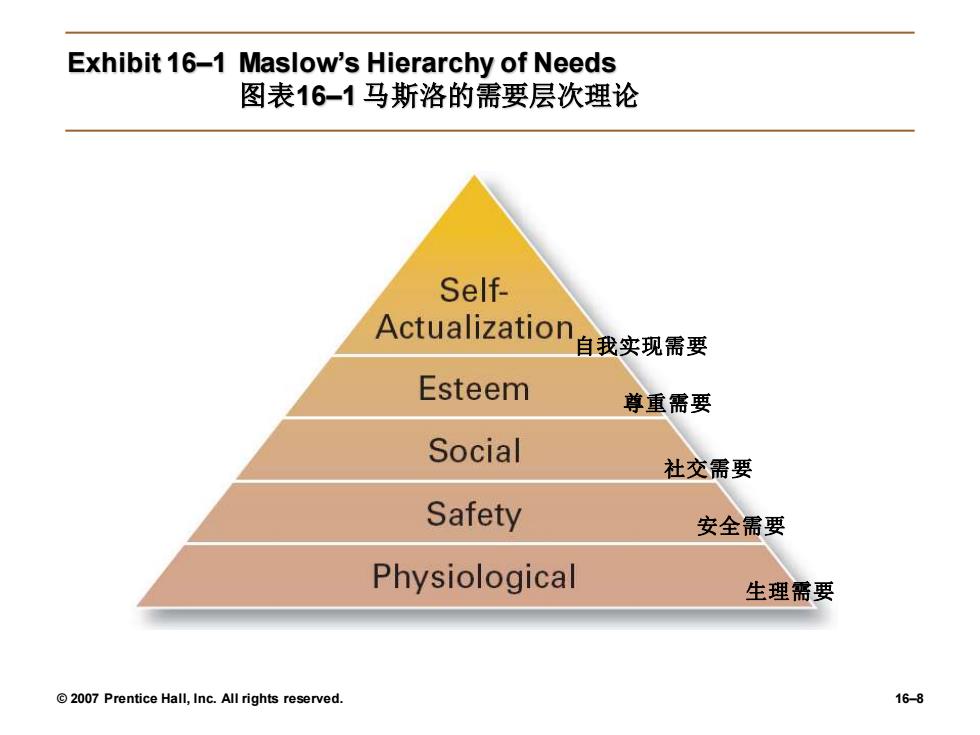
Exhibit 16-1 Maslow's Hierarchy of Needs 图表16-1马斯洛的需要层次理论 Self- Actualization自我实现需要 Esteem 尊重需要 Social 社交需要 Safety 安全需要 Physiological 生理需要 2007 Prentice Hall,Inc.All rights reserved. 16-8
© 2007 Prentice Hall, Inc. All rights reserved. 16–8 Exhibit 16–1 Maslow’s Hierarchy of Needs 图表16–1 马斯洛的需要层次理论 生理需要 安全需要 社交需要 尊重需要 自我实现需要
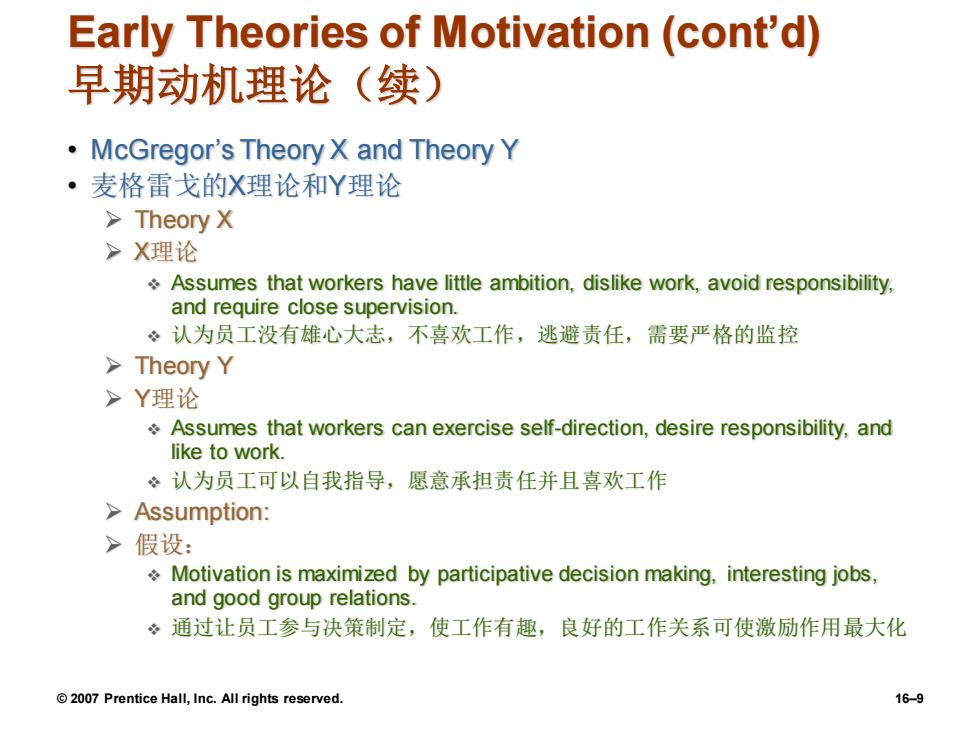
Early Theories of Motivation(cont'd) 早期动机理论(续) McGregor's Theory X and Theory Y ·麦格雷戈的X理论和Y理论 >Theory X >X理论 Assumes that workers have little ambition,dislike work,avoid responsibility, and require close supervision. 。认为员工没有雄心大志,不喜欢工作,逃避责任,需要严格的监控 >Theory Y >Y理论 Assumes that workers can exercise self-direction,desire responsibility,and like to work. ·认为员工可以自我指导,愿意承担责任并且喜欢工作 >Assumption: >假设: Motivation is maximized by participative decision making,interesting jobs, and good group relations. ÷通过让员工参与决策制定,使工作有趣,良好的工作关系可使激励作用最大化 2007 Prentice Hall,Inc.All rights reserved. 16-9
© 2007 Prentice Hall, Inc. All rights reserved. 16–9 Early Theories of Motivation (cont’d) 早期动机理论(续) • McGregor’s Theory X and Theory Y • 麦格雷戈的X理论和Y理论 ➢ Theory X ➢ X理论 ❖ Assumes that workers have little ambition, dislike work, avoid responsibility, and require close supervision. ❖ 认为员工没有雄心大志,不喜欢工作,逃避责任,需要严格的监控 ➢ Theory Y ➢ Y理论 ❖ Assumes that workers can exercise self-direction, desire responsibility, and like to work. ❖ 认为员工可以自我指导,愿意承担责任并且喜欢工作 ➢ Assumption: ➢ 假设: ❖ Motivation is maximized by participative decision making, interesting jobs, and good group relations. ❖ 通过让员工参与决策制定,使工作有趣,良好的工作关系可使激励作用最大化
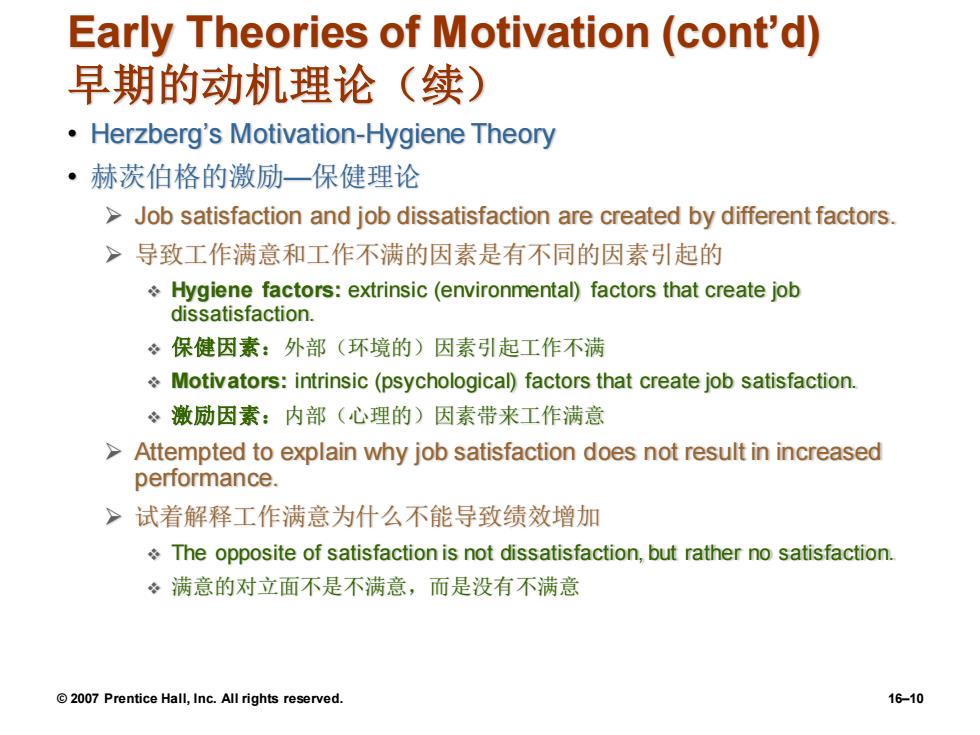
Early Theories of Motivation (cont'd) 早期的动机理论(续) Herzberg's Motivation-Hygiene Theory ·赫茨伯格的激励一保健理论 Job satisfaction and job dissatisfaction are created by different factors. >导致工作满意和工作不满的因素是有不同的因素引起的 Hygiene factors:extrinsic (environmental)factors that create job dissatisfaction. ÷保健因素:外部(环境的)因素引起工作不满 Motivators:intrinsic(psychological)factors that create job satisfaction. ·激励因素:内部(心理的)因素带来工作满意 >Attempted to explain why job satisfaction does not result in increased performance. >试着解释工作满意为什么不能导致绩效增加 The opposite of satisfaction is not dissatisfaction,but rather no satisfaction. ÷满意的对立面不是不满意,而是没有不满意 2007 Prentice Hall,Inc.All rights reserved. 16-10
© 2007 Prentice Hall, Inc. All rights reserved. 16–10 Early Theories of Motivation (cont’d) 早期的动机理论(续) • Herzberg’s Motivation-Hygiene Theory • 赫茨伯格的激励—保健理论 ➢ Job satisfaction and job dissatisfaction are created by different factors. ➢ 导致工作满意和工作不满的因素是有不同的因素引起的 ❖ Hygiene factors: extrinsic (environmental) factors that create job dissatisfaction. ❖ 保健因素:外部(环境的)因素引起工作不满 ❖ Motivators: intrinsic (psychological) factors that create job satisfaction. ❖ 激励因素:内部(心理的)因素带来工作满意 ➢ Attempted to explain why job satisfaction does not result in increased performance. ➢ 试着解释工作满意为什么不能导致绩效增加 ❖ The opposite of satisfaction is not dissatisfaction, but rather no satisfaction. ❖ 满意的对立面不是不满意,而是没有不满意